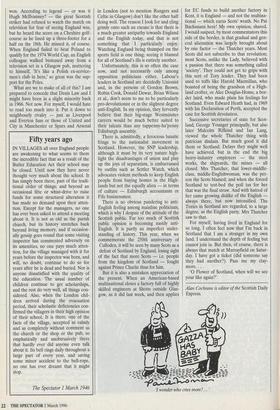Fifty years ago
IN VILLAGES all over England people are awakening to what seems to them the incredible fact that as a result of the Butler Education Act their school may be closed. Until now they have never thought very much about the school. It has simply been there, part of the tradi- tional order of things; and beyond an occasional fête or whist-drive to raise funds for some structural alteration it has made no demand upon their atten- tion. Except for the managers, no one has ever been asked to attend a meeting about it. It is not as old as the parish church, but its history stretches back beyond living memory, and if occasion- ally gossip goes round that some visiting inspector has commented adversely on its amenities, no one pays much atten- tion, for the village managed with it for years before the inspector was born, and will, no doubt, continue to do so for years after he is dead and buried. Nor is anyone dissatisfied with the quality of the education. The usual number of children continue to get scholarships, and the rest do very well, all things con- sidered. Also, when the London chil- dren arrived during the evacuation period, their scholastic deficiencies con- firmed the villagers in their high opinion of their school. It is there, one of the facts of the village, accepted as calmly and as completely without comment as the church or the shop or the pub, so emphatically and unobtrusively there that hardly ever did anyone even talk about it. Its bell rings daily throughout a large part of every year, and saving some minor accident to the bell-rope, no one has ever dreamt that it might stop.
The Spectator 1 March 1946


































































 Previous page
Previous page